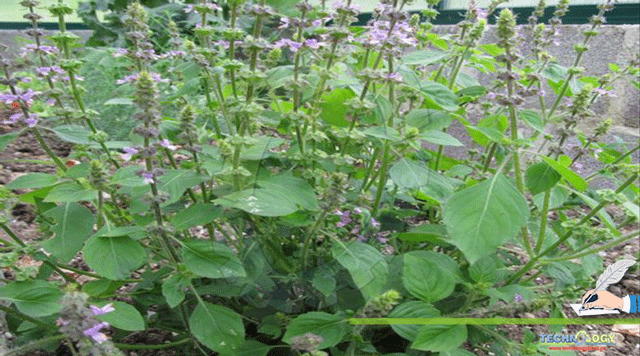Plants are of the important sources of medicine and a large numbers of drugs in use today are derived from plants. Ocimum basilicum L. commonly known as Sweet basil (Lamiaceae) is used in both Ayurvedic and Unani system of medicine. It is also popular as ornamental crop.

By Zil-e-Haleefa, H. U. Khan, Syed Aneel Gilani, Shahnaz Zakia, Amir Hussain, Ghulam Abbas
Sweet basil is indigenous to lower hills of Punjab in India, Persia and Sindh but also grown in several Mediterranean countries including Turkey. Ocimum (from Greek ozo for smell) is appropriate for the genus since its various species are known for their peculiar strong odors. Basilicum is the Latin translation of the Greek “basilikon” meaning king and due perhaps the same reason the herb is called “Herbe Royale” in French. The Urdu/Punjabi name Niazbo is also reflective of its pleasant odor.
Ocimum basilicum L. is a common herb, grown in many households with a wide range of therapeutic properties. Basil grows as a perennial in tropical climates, and is planted as an annual in temperate regions, where it may be sown directly from seed or transplanted. As basil is a highly frost sensitive plant, it must be protected against temperatures close to freezing. Basil prefers to be grown in full sun, however will grow (albeit with less vigor) in partial shade. To avoid “damping off” disease, basil should not be overwatered. Basil may be sown outside after there is no danger of frost, or started inside and transplanted outdoors for an earlier harvest. Seeds germinate in four or five days and remain viable for years if stored in dry conditions. In colder climates, basil may be productively cultivated indoors in pots.
It would be a blessing in disguise if this herb becomes a medicine for the common man. More clinical trials are needed to be conducted to support its medicinal and therapeutic uses. Since the basil plant (O. basilicum) is cultivated in our plane areas and as a garden ornamental plant, its various parts, particularly its leaves, seeds and roots are commonly used as daily household remedies. Various plant parts are recommended for the common people as folk medicines as exhilarants (demulcent), expectorant, antiperiodics and emmenagogues. Its leaves are often fragrant, aromatic (antiseptic) and are also used as an expectorant. Decoction of the leaves, given in gastric and hepatic disorders and is useful in catarrh, bronchitis, in cough (due to heat), acts as diuretic and emmenagogues as well as tonic for stomach. Its leaves are brushed into paste and applied over the inflammations. Its seeds are mucilaginous and demulcent, used for heat, as a household remedy when utilized in the form of syrups particularly in summer season. Seeds are also recommended as folk medicines for urino-genital complaints, such as gonorrhoea. Oil of seeds is employed in syphilis, otitis and otorrhoea, whereas the fragrant oil of basil leaves and seeds (obtained after steam distillation) are used in perfumes and toiletries. Syrup in which seeds are added becomes mucilaginous within minutes, which is effective against cardiac debility and palpitation. Decoction of roots is useful in malarial fever as antiperiodics. Extract of leaves is useful in earache (as drops).
Basil is well-known for its folk medicinal value and is accepted officially in a number of countries. The leaves and flowers of basil are used in folk medicine as a tonic and vermifuge, and basil tea is good for treating dysentery, nausea and flatulence. The oil of the plant is beneficial for rhinitis mental fatigue, cold, and as a first aid treatment for wasp stings and snakebites. Basil cures headache, improves digestion and is also good for toothache, earache and for curing epistaxis when used with camphor. Infusion of plant is effective in gouty joints, fever, otitis and snake bite. The plant is effective in treatment of stomach problems, fever, cough, gout and given internally to treat cystitis, nephritis and in internal piles. Infusion of basil seed is used to treat gonorrhea, chronic diarrhea and dysentery. Plant is also used to keep away insects and snakes.
Throughout the world plants are used for the treatment of many diseases. Sweet basil is famous for its ornamental and culinary uses. It is also used in Unani and Ayurvedic medicinal system. From medicinal point of view, the vast survey of literature showed that O. basilicum has a huge spectrum of pharmacological activities. Crude extracts and essential oil of various parts of plants have been used for their anticancer activity, antioxidant activity, memory retention and stroke activity, cardioprotective and stimulant activity, antimycobacterial activity and antiviral activity, and antiparasitic activity. Sweet basil with diverse biological potentials has a great scope for further new area of investigations. Future research should be emphasized on O. basilicum for evaluation of its pharmacological properties and for control of various diseases especially in cancer, cardiac, neuropsychological disorders for the welfare and service of mankind.